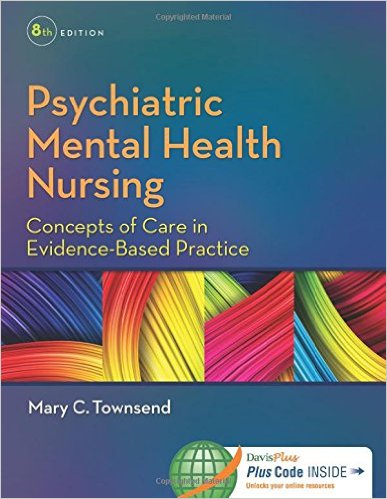Test Bank For Instructor Manual for Psychiatric Mental Health Nursing, Concepts of Care in Evidence-Based Practice 8th Edition by Mary C. Townsend
Original price was: $100.00.$35.00Current price is: $35.00.
Test Bank For Instructor Manual For Psychiatric Mental Health Nursing, Concepts Of Care In Evidence-Based Practice 8th Edition By Mary C. Townsend is a book that provides a comprehensive overview of psychiatric mental health nursing. It covers a wide range of topics, from assessment and diagnosis to treatment and recovery.
The book also includes a section on evidence-based practice, which is an increasingly important topic in the field of mental health nursing. Test Bank For Instructor Manual For Psychiatric Mental Health Nursing, Concepts Of Care In Evidence-Based Practice 8th Edition By Mary C. Townsend is a valuable resource for psychiatric mental health nurses at all stages of their career.
Digital item No Waiting Time Instant Download
ISBN-10 9780803640924ISBN-13 978-0803640924
Description
Test Bank For Instructor Manual for Psychiatric Mental Health Nursing, Concepts of Care in Evidence-Based Practice 8th Edition by Mary C. Townsend
Case Study, Chapter 1, Foundations of Psychiatric–Mental Health Nursing
Case Study 1
Maria Torres is a 23-year-old Hispanic single mother of two and is enrolled as a student at the local community college. She works 30 hours a week as a waitress at a local restaurant in addition to her coursework. Maria states that she is “excited about her future career as a computer programmer.” She manages her living expenses marginally but states that she is reasonably happy and satisfied with her life. She states that she is getting good grades in her college courses. Her mother helps care for her two small children when Maria is at school, studying, or working. (Learning Objectives 1 and 4)
- Based on this information, what personal factors or characteristics would reflect Maria’s current state of mental health or illness according to the information in Chapter 1?
- What if Maria’s situation suddenly changed and she lost her housing? What concerns would you, as the nurse, have for Maria and her children now? How would you counsel Maria to obtain the needed assistance and support she requires in the face of her new situation?
Case Study 2
The student nurse is accompanying the psychiatric nurse in a nursing assessment of a newly admitted patient. The psychiatric nurse tells the student nurse that the patient is profoundly depressed and has refused to bathe or eat for the last week. The psychiatric nurse stressed that all patients admitted to a hospital for psychiatric treatment will have a diagnosis from the DSM stated on the chart by the psychiatrist. The nurse explains that the nursing diagnosis will consider past and present responses to actual mental health problems and provides a conceptual framework for identifying interventions for the abnormality the patient is experiencing. (Learning Objective 2)
- The student nurse asked the psychiatric nurse what type of patient information the DSM is associated with.
- How does the DSM diagnosis affect patient care?
- What information do the DSM criteria impart to the multidisciplinary team members?
-
Assignments, Chapter 1, Foundations of Psychiatric–Mental Health Nursing
Written Assignments
Learning Objective(s)
1. Develop a timeline of historical landmarks in psychiatric nursing.
3
2. Before a mental health clinical, list concerns about interacting and communicating with the mentally ill client.
6
Group Assignments
Learning Objective(s)
1. In a group setting, form a list of possible mental health nursing diagnoses and place each on the correct DSM-IV-TR axis. Discuss the relevance of the GAF score in the care of the mentally ill client.
2
2. Show the HBO documentary Back from Madness, which follows four patients for 2 to 3 years. This video is unusual because it interviews actual clients. It also has “flashbacks” to historical clips.
4
Clinical Assignments
Learning Objective(s)
1. Begin a reflective journal the day before the first mental health clinical experience. Reflect about feelings regarding this experience. Later in the clinical experience, reflect on this entry to see how your feelings may have changed.
1
2. Invite a representative of the American Nurses Association (ANA) to discuss standards of practice for psychiatric mental health nursing during a postconference.
5
Web Assignment
Learning Objective
1. Utilizing the Internet, locate the Web site for the National Alliance for the Mentally Ill (NAMI) to explore the type of information, support, and advocacy that is available.
4
-
Assignments, Chapter 2, Neurobiologic Theories and Psychopharmacology
Written Assignments
Learning Objective(s)
1. Given an unlabeled diagram, label the structures of the brain. Include the function of each structure.
1
2. Given a scenario, list teaching components for client and families toward the implementation of the prescribed therapeutic regimen.
8
Group Assignments
Learning Objective(s)
1. Each group member is to describe a brain imaging technique used in the diagnosis of mental disorders.
4
2. Discuss barriers to effective medication regimen in the mentally ill client.
7
Clinical Assignments
Learning Objective(s)
1. Prepare a medication teaching plan for a client receiving antidepressant medication.
3
2. For an assigned client, develop a drug card related to a prescribed psychotropic medication. Include action, side effects, and nursing considerations.
5
3. During a clinical postconference, evaluate the effectiveness of a psychotropic drug that was administered for an assigned client.
6
Web Assignment
Learning Objective
1. Conduct an online research of neurobiologic theories related to psychopharmacologic treatment of mental disorders.
2





Be the first to review “Test Bank For Instructor Manual for Psychiatric Mental Health Nursing, Concepts of Care in Evidence-Based Practice 8th Edition by Mary C. Townsend”